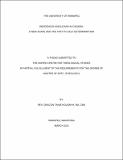Indigenous Anglicans in Canada: A New Agape and the Path to Self-Determination
Metadata
Show full item recordAuthor
Kolisnyk, Tanis
Date
2015-04-22Citation
Kolisnyk, Tanis. Indigenous Anglicans in Canada: A New Agape and the Path to Self-Determination; A Thesis submitted to the United Centre for Theological Studies in partial fulfillment of the Requirements for the degree of Master of Arts (Theology). Winnipeg, Manitoba, Canada: University of Winnipeg, 2015.
Abstract
The encounter between Indigenous peoples and settlers in North America is rife with challenges and missed opportunities, and marred by colonial domination, resulting in great harm to Indigenous people. The Anglican Church of Canada had a part to play, and now acknowledges that Indigenous spirituality and culture were overlooked and negated in missionary efforts, residential schools, and dominant church practices. The way forward involves looking backward to acknowledge the pain that the colonial Anglican Church imposed on the Indigenous peoples of Canada. In the past twenty years, there has been an effort to find ways forward in healing and reconciliation for Indigenous and Non-Indigenous Anglicans. In this thesis, I will look at both internal and external factors and answer the question: “What are the barriers that are impeding self-determination of Indigenous Anglicans in the Anglican Church of Canada?”
I am an Anglican woman who loves the Church. I am Métis from Manitoba and part of the network of Indigenous people of this land. I was recently ordained in the Anglican Church of Canada into diaconal ministry. I believe that new opportunities for Indigenous and Non-Indigenous Anglicans are possible as together we journey with a renewed sense of hope and faith. There is a cultural and spiritual renaissance happening within Indigenous communities and this impacts Indigenous Anglicans in their quest for self-determination within the Anglican Church. Throughout the world, there is a rapid process of decolonization taking place. As the world continues to shrink, and awareness of cultural is heightened, there is no longer any room for racism within Canadian society or within the Church. Christian roots evolved from a Judaic tribal culture and history. Christianity did not displace, but rather built on key theological concepts. Likewise, I believe that Indigenous Anglicans here in Canada have the same opportunity to evolve and discover their own place in the story of the Church. Resilience and a rich spirituality provided a strong foundation to live life in a good way. Indigenous Anglicans no longer have to compromise or apologize for honouring their traditional Indigenous values and sacred rituals while still embracing the Gospel. In this time in our history, all Anglicans have the opportunity to walk with Indigenous people. We have been invited to listen, learn, honour them and celebrate the recovery and restoration of right relationships. The work toward wholeness will continue to demolish barriers of gender, race, social class, and sins against each other. My hope is that self-determination will allow God’s peace to flow freely. I believe that God’s grace is leading the Church to a turning point in its history.

